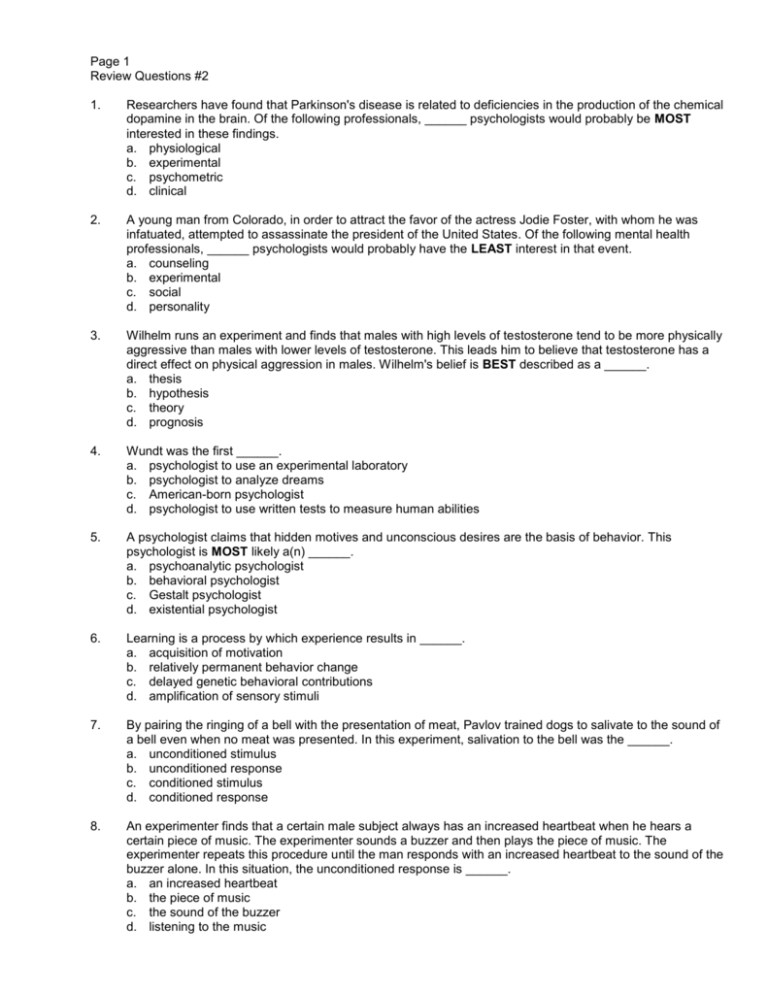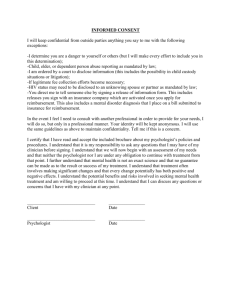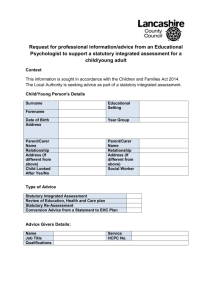AP_Review_Questions_II
advertisement

Page 1 Review Questions #2 1. Researchers have found that Parkinson's disease is related to deficiencies in the production of the chemical dopamine in the brain. Of the following professionals, ______ psychologists would probably be MOST interested in these findings. a. physiological b. experimental c. psychometric d. clinical 2. A young man from Colorado, in order to attract the favor of the actress Jodie Foster, with whom he was infatuated, attempted to assassinate the president of the United States. Of the following mental health professionals, ______ psychologists would probably have the LEAST interest in that event. a. counseling b. experimental c. social d. personality 3. Wilhelm runs an experiment and finds that males with high levels of testosterone tend to be more physically aggressive than males with lower levels of testosterone. This leads him to believe that testosterone has a direct effect on physical aggression in males. Wilhelm's belief is BEST described as a ______. a. thesis b. hypothesis c. theory d. prognosis 4. Wundt was the first ______. a. psychologist to use an experimental laboratory b. psychologist to analyze dreams c. American-born psychologist d. psychologist to use written tests to measure human abilities 5. A psychologist claims that hidden motives and unconscious desires are the basis of behavior. This psychologist is MOST likely a(n) ______. a. psychoanalytic psychologist b. behavioral psychologist c. Gestalt psychologist d. existential psychologist 6. Learning is a process by which experience results in ______. a. acquisition of motivation b. relatively permanent behavior change c. delayed genetic behavioral contributions d. amplification of sensory stimuli 7. By pairing the ringing of a bell with the presentation of meat, Pavlov trained dogs to salivate to the sound of a bell even when no meat was presented. In this experiment, salivation to the bell was the ______. a. unconditioned stimulus b. unconditioned response c. conditioned stimulus d. conditioned response 8. An experimenter finds that a certain male subject always has an increased heartbeat when he hears a certain piece of music. The experimenter sounds a buzzer and then plays the piece of music. The experimenter repeats this procedure until the man responds with an increased heartbeat to the sound of the buzzer alone. In this situation, the unconditioned response is ______. a. an increased heartbeat b. the piece of music c. the sound of the buzzer d. listening to the music 9. The process by which some stimuli, such as snakes, serve readily as conditioned stimuli for certain responses, such as fear in humans, is called ______. a. mental set b. the diathesis-stress model c. preparedness d. response acquisition 10. A child is scolded for using his fingers instead of his fork to eat some spaghetti. The scolding stops when he picks up his fork. Stopping the scolding is an example of ______ reinforcement. a. positive b. negative c. tertiary d. secondary 11. For Freud, the only personality structure present at birth is the ______. a. id b. ego c. superego d. persona 12. According to Jung, the memories and behavior patterns inherited from past generations are part of the ______. a. persona b. alter-ego c. personal unconscious d. collective unconscious 13. Jamie is unsociable and lacks confidence in dealing with people. She is more concerned with her own private world than the people and events around her. In Jung's view, she is an ______. a. archetype b. ectomorph c. introvert d. extrovert 14. Erikson argues that for people to establish a sense of intimacy, they must feel secure in their ______. a. identity b. generativity c. persona d. integrity 15. A famous psychologist argues that personality theories should emphasize people's potential for growth and change, not just the resolution of unconscious conflicts, as well as the ways they subjectively experience their lives right now. In addition, each individual is personally responsible for his or her own behavior. This psychologist's views are typical of ______ psychology. a. psychodynamic b. humanistic c. object relations d. behavioral Page 1 1. 2. 3. 4. 5. 6. 7. 8. 9. 10. 11. 12. 13. 14. 15. a b c a a b d a c b a d c a b




